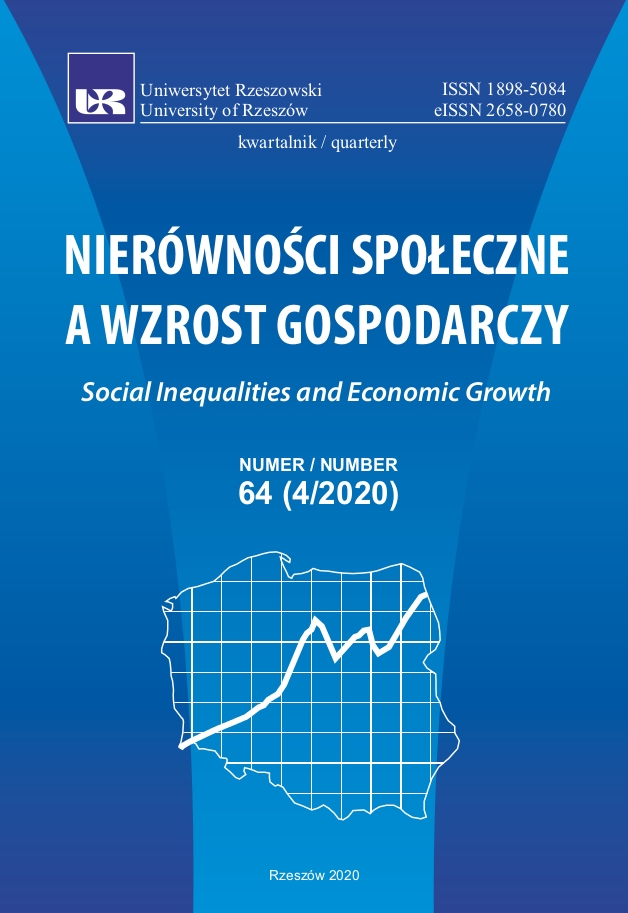The role of social leader in creating better life conditions
DOI:
https://doi.org/10.15584/nsawg.2020.4.14Keywords:
co-operatives, social leader, enterprise, local society, PolandAbstract
This paper presents the role of co-operative leaders in creating a better life in the communal scope. Pioneers and activists from succeeding generations established many forms of common co-operative activities in the 19th and 20th centuries in different areas of the Polish lands. The main goals were to consider the groups of people living in poverty among the peasants, craftsmen and merchants, and to combine them in common economic activities, including social and cultural work toward national spirit. There were still co-operative leaders operating during the inter-war period, during the Nazi occupation, after the Second World War and the times of transition after 1989/1990. Their activities are shown in the historical perspective, against social and local backgrounds, the methods of the co-operative movement, careers, personal attributes and achievements. The characteristics of these co-operative leaders from past and contemporary times can be useful in understanding actual challenges for co-operative leaders in a local scope. The paper is based on historical analysis of biographical and historical literature, scientific workshops and contemporary co-operative journalism.
The system of co-operative education in towns and the countryside were destroyed during the transition period. The many occasional courses and training sessions, organized by co-operative auditory unions for their employees, cannot excise this gap. The education of contemporary managers is oriented toward free market rivalry, corporations and the race for enlarging surpluses, eliminating social responsibility for business organization and collaboration in the needs of local societies. Examples of co-operative leaders can be useful in the creation of activists for the social economy. Modern co-operative leaders should combine a charismatic personality with extensive knowledge and an annalistic mind. They are the hope for the revitalization of the co-operative movement.
Downloads
References
Chyra-Rolicz, Z. (1998). Spółdzielczość – ofiara czy filar systemu socjalistycznego? W: W. Ważniewski (red.), Spór o ocenę Polski powojennej (1944–1989) (s. 153–167). Siedlce: Pracownia Wydawnicza IH WSRP.
Chyra-Rolicz, Z. (2002). Edward Abramowski – prekursor społeczeństwa obywatelskiego i społecznej gospodarki rynkowej. W: M. M. Drozdowski (red.), Od Edwarda Abramowskiego do Jana Józefa Lipskiego. Z dziejów niepodległościowego i demokratycznego nurtu w polskim ruchu socjalistycznym (s. 16–30). Warszawa: Wydawnictwo Typografika.
Chyra-Rolicz, Z. (2004). Stanisław Staszic prekursor spółdzielczości rolniczej. Siedlce: Pracownia Wydawnicza IH AP.
Chyra-Rolicz, Z. (2011). Wielkie damy polskiej spółdzielczości, W: W. Wrzesiński, M. Masnyk, K. Kawalec (red.), Polska Leży na Zachodzie. Studia z dziejów Polski i Europy dedykowane Pani Profesor Teresie Kulak (s. 559–573). Toruń: Wydawnictwo Adam Marszałek.
Chyra-Rolicz, Z. (2020). Samorządność gospodarcza i społeczna na przykładzie sektora spółdzielczego (1989–2018). W: E. Leś (red.), Dla Niepodległej. Obywatele i ich organizacje 1918–2020. Warszawa.
Galos, A., Inglot, S. (red.), Najdus, W., Piechowicz, S., Świtalski, Z. (1971). Zarys historii polskiego ruchu spółdzielczego, cz. I: do 1918 r. (s. 259–294). Warszawa: Zakład Wydawnictw CRS.
Gurnicz, F. (1976), Franciszek Stefczyk – Życie Poglądy Działalność. Warszawa: Zakład Wydawnictw CRS.
http://ozrss.pl/zwiazek/czlonkowie (2020.04.19).
ICA Research International Conference Future of Cooperative model: Creativity, Innovation and Research, Program. Book of abstracts, 2015, Okrągły Stół nr 1 – panel 28.05.2015, Paris.
Jarecka-Kimlowska, S. (1971). O równy start. Szkice z dziejów „Wici” 1928–1948. Warszawa: LSW.
Lachowski, K., Englot, A. (2016). Informacja o podstawowych danych ekonomiczno-finansowych dotyczących sektora spółdzielczego w roku 2014 i ich zmianach w latach 2011–2014. Warszawa: KRS.
Piasecki, A. K. (red.). (2013). Lider społeczny w XXI wieku. Kraków: Wydawnictwo UP.
Rapacki, M. (1936). Program gospodarczy spółdzielczości spożywców. Referat wygłoszony na zjeździe delegatów „Społem” w dniu 14 VI 1936 (wyd. I), Warszawa: ZSS RP.
Rusiński, W. (1980). Zarys historii polskiego ruchu spółdzielczego, cz. 2: 1918–1939. Warszawa: Zakład Wydawnictw CZRS.
Thugutt, S. (2013). Listy do młodego przyjaciela. Wstęp R. Okraska. Łódź: Wydawnictwo „Nowy Obywatel”.
Trocka, H. (2004). Spółdzielczość polska w kampanii wrześniowej i antyhitlerowskim ruchu oporu na terenie Generalnego Gubernatorstwa. Warszawa: Wydawnictwo Czasopismo „Spółdzielca”.
Wiele barw przedsiębiorczości społecznej. (2010). Kurier Spółdzielczy, 23/24(2020/2021), 1, 8.
Downloads
Published
How to Cite
Issue
Section
License
Copyright (c) 2020 University of Rzeszow

This work is licensed under a Creative Commons Attribution-ShareAlike 4.0 International License.


